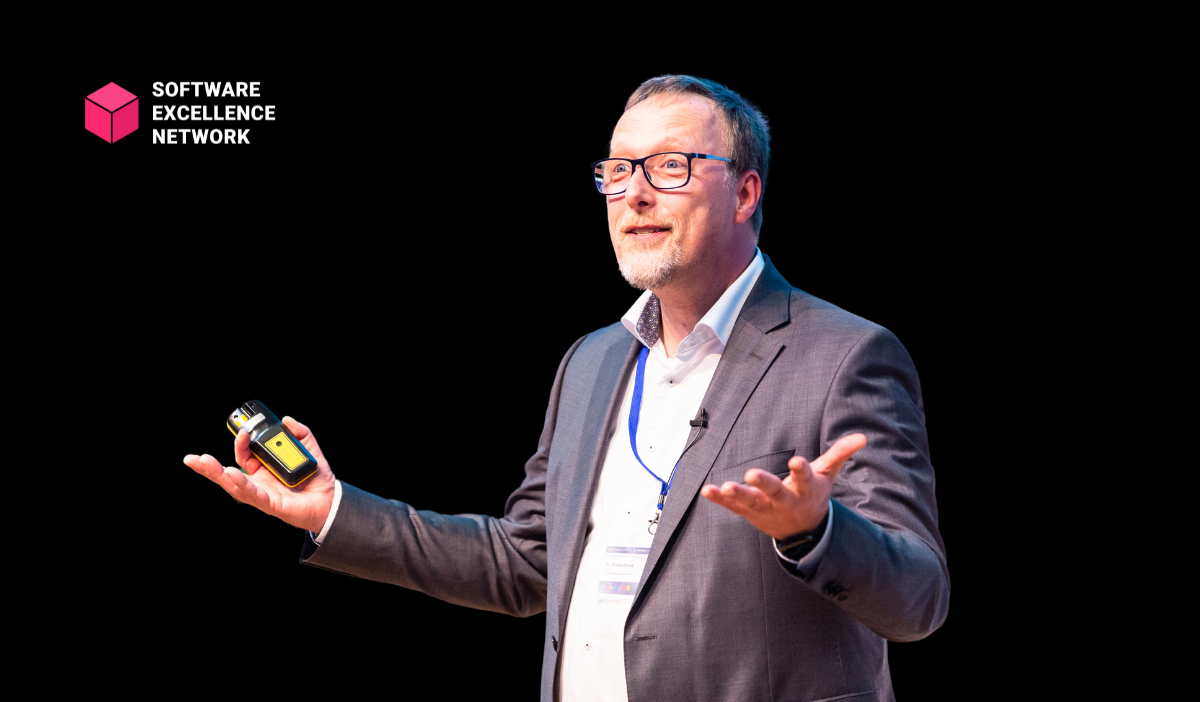
Dr. René Deist, SVP of Internal Digitalization at ZF Group, recently delivered a compelling keynote at the "Softwareproduktion & Sustainability" executive summit. His speech, titled "A Threefold Transformation Toward a Data-Driven Company," offered a profound look into how ZF, a global automotive powerhouse, is navigating its transformation journey. Here, we expand on the core themes he explored, illustrating how ZF is positioning itself as a leader in the data-driven automotive revolution.

ZF’s roots as a traditional hardware manufacturer are undeniable—it has long been synonymous with gears, components, and mechanical systems. However, the landscape of the automotive industry has changed dramatically. Dr. Deist emphasized that ZF is no longer just about gears and hardware; it’s about integrating software solutions at every level.
ZF’s foray into autonomous systems, motion control, and electric mobility showcases its evolution. For instance, the company’s operating systems for autonomous driving aren’t merely software add-ons but are at the core of its product ecosystem. Dr. Deist likened this transformation to building a highly scalable and reliable computational backbone, comparable to how Microsoft designs cloud ecosystems.
One of the most critical enablers of ZF’s transformation is its robust cloud strategy. Dr. Deist shared how ZF developed a versatile cloud infrastructure that supports multi-cloud environments, enabling seamless integration across different systems. This adaptability ensures that ZF can cater to the unique needs of diverse customers while maintaining operational efficiency.
ZF’s cloud infrastructure isn't just a data repository—it is a transformative tool. Through real-time data analysis, ZF has achieved predictive maintenance, optimized supply chains, and enhanced production workflows across its 183 global manufacturing facilities. This aligns with ZF’s commitment to sustainability, as streamlined processes lead to reduced waste and energy consumption.
ZF’s vision extends beyond traditional automotive applications to embrace the broader concept of mobility ecosystems. The company has been actively developing smart shuttles and autonomous transportation solutions, addressing urban mobility challenges. Dr. Deist highlighted the interconnected nature of smart cities and autonomous vehicles, explaining how ZF’s solutions integrate seamlessly with infrastructure like traffic lights and parking systems.
One standout example is ZF’s ATS (Autonomous Transport System), a shuttle solution that combines software, hardware, and sensors to deliver safe and efficient mobility. While ZF doesn’t intend to commercialize these shuttles at scale, they serve as testbeds for innovations that will redefine commercial vehicle operations.

Internally, ZF is undergoing a cultural and structural shift to align with its digital ambitions. Dr. Deist noted that the company is embracing agile methodologies and over-the-air updates to bring flexibility and speed to its operations. This change mirrors trends in the tech industry, where iterative development and customer-centric design are key.
ZF’s Accelerate Excellence initiative exemplifies this internal transformation. By bridging software development across divisions, ZF is creating an integrated ecosystem where every process is data-informed. This holistic approach ensures that innovation doesn’t happen in silos but permeates the entire organization.
Collaboration is another cornerstone of ZF’s strategy. Dr. Deist described how partnerships, such as the one with Microsoft, are accelerating ZF’s ability to innovate. Microsoft’s cloud capabilities have enabled ZF to build a centralized platform for production monitoring and supply chain management, unlocking efficiencies at a scale previously unimaginable.
These partnerships also extend to municipalities and urban planners as ZF develops systems that connect vehicles with smart city infrastructure. By collaborating across industries, ZF is driving the evolution of mobility as a service.
Finally, Dr. Deist underscored the importance of sustainability in ZF’s transformation. The company’s cloud-enabled production systems minimize resource consumption while maximizing output. Moreover, ZF’s innovations in electric mobility and renewable energy applications, such as wind turbines, demonstrate a commitment to environmental stewardship.
Sustainability isn’t just a buzzword at ZF—it’s a guiding principle that shapes every decision, from product design to supply chain management.
Dr. Deist’s presentation painted an inspiring picture of ZF Group as a forward-thinking, data-driven company. By combining its hardware expertise with cutting-edge software capabilities, ZF is well-positioned to lead the automotive industry into a future defined by smart mobility, sustainable solutions, and unparalleled innovation.
As Dr. Deist noted, software is more important than a gear, and it opens up new possibilities for growth. ZF’s journey is a testament to how legacy companies can reinvent themselves through bold leadership and a relentless focus on transformation.
The Software Excellence Network is a community of top IT executives and academic experts brought together by a shared interest in tackling software development's biggest challenges. Through open dialogue among peers, the Software Excellence Network aims to unleash innovation on the European continent. This event and this masterclass were hosted by the SEN and its partners, the Hasso Plattner Institute, Microsoft, Seerene, and MaibornWolff.
A Note to Our Readers: This article is a journalistic summary of the ideas expressed by Dr. Deist in his masterclass. For the full context and richness of Dr. Deist's insights, we invite you to watch his full masterclass below in German. If you have any comments or concerns, do not hesitate to contact us.
These Stories on Events/Webinars
August-Bebel-Str. 26-53
14482 Potsdam, Germany
hello@seerene.com
+49 (0) 331 706 234 0
Generative AI Seerene GmbH
August-Bebel-Str. 26-53
14482 Potsdam, Germany
hello@seerene.com
+49 331 7062340